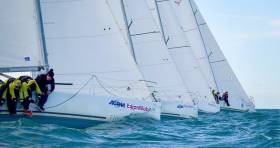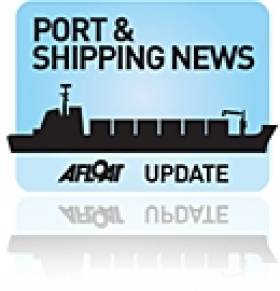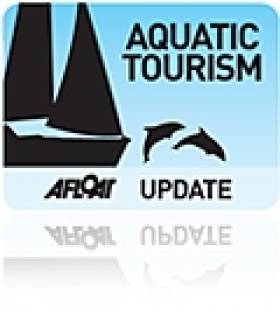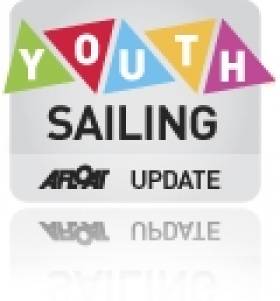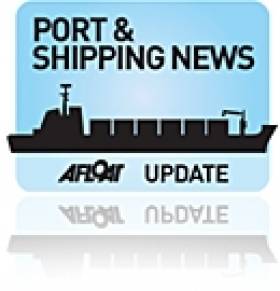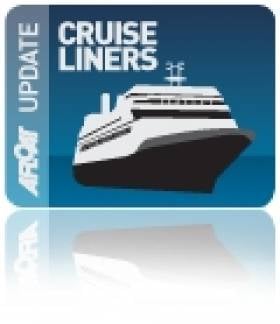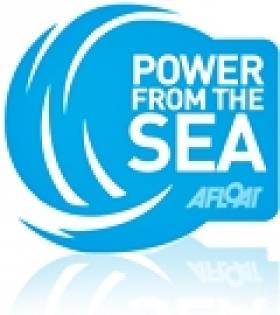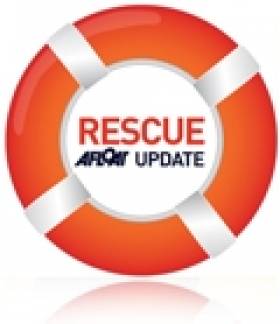Displaying items by tag: Cork Institute of Technology
Cork Institute of Technology Lying Third At Student Yachting World Cup
Tiredness slowly settled in after the demanding first few days of competition at the Student Yachting world Cup in France. The night race of the second day added even more strain to the crews, who quickly realized that perseverance would be as needed as raw skills to win the races from now on.
Three open sea races and one coastal race were run on this third day, just a stone’s throw away from the renowned Fort Boyard. The last one allowed competitors to win points for the special Trophy of our sponsor AGPM. Despite a tight competition, the USA Team won every race one after another and took the lead on the provisional ranking.
Unfortunately, the Japanese Team had to forfeit in the middle of the day due to an accident. The crew member was quickly taken to the closest hospital and got out in the next morning.
The day ended up with a Karaoke where the Loughborough Team made a remarkable performance of “Let it go”. After three days of racing, the overall results are as follows : first comes the California Maritime Academy (USA-20 points) followed by Southampton University (UK-23 points), Cork Institute of Technology (Ireland) and Queen’s University (Canada) at 26 points, EPFL (Switzerland-35points), Loughborough (UK-36 points), Strathclyde University (Scotland-54 points) and Kobe University (Japan-67 points).
#ChamberOnboardCIT - The Irish Chamber of Shipping are pleased to announce that they have been successfully represented on the Cork Institute of Technology's Governing Body.
CIT's Governing Body chairman, Mr. Bob Savage on behalf of the Minister for Education and Skills, Ms. Jan O' Sullivan confirmed the appointment of Captain Dave Hopkins.
Speaking on the news, Mr John Toner, President of the Irish Chamber of Shipping said "On behalf of the Council of the Irish Chamber of Shipping, I would like to congratulate Dave Hopkins on his appointment and also to congratulate and thank Conor Mowlds on successfully proposing representation from our industry in recognition of the great contribution that NMCI has to CIT."
Mr Toner added "It is a very significant step in our progress to actively involve the shipping industry in the key elements of our support structures and services within Ireland. It is important not just for our members but for shipping companies intending to set up in Ireland to know that there is yet another close involvement of the industry with key Maritime education providers."
The Governing Body, under the terms of the Institutes of Technology Act (1992 - 2006), shall manage and control the affairs of the Institute and shall perform the functions conferred on the Institute. It is, therefore, the authority established by law to govern the Institute.
#coolroutes – Cork Institute of Technology (CIT) is very strongly extending its research and development into a wide range of European regions. The institute has just been awarded a significant project to develop a new maritime tourism route between Cork and Arctic Circle areas of Norway. The objective is to establish a yacht cruising route extending from Cork in Ireland via Northern Ireland and Scotland to the Faroe Islands and Norway. The route, once operational is envisaged to create a wide range of local economic opportunities in very beautiful and peripheral locations.
The Northern Peripheral and Arctic Interreg VB Programme (NPA) funds transnational projects addressing transnational innovation, enterprise development and entrepreneurship across the programme territories covering Southern and Western Ireland, Northern Ireland, Western and Northern Scotland, the Faroe Islands, Western Norway, Iceland and Greenland.
CIT has now received funding for a project valued at €1.26 million to develop a coordinated yacht cruising route, stretching around the coastline of the NPA. The project entitled "Cruising Oceans on Latitudes above 51 º North " - The " COOL Route", was recently approved by the NPA Interreg Programme and will research all of the logistical, business and marketing planning for the route, which will support other complimentary maritime and shore based tourism initiatives in all of the intervening regions along the route.
Partners and responsibilities in the COOL Route Project are Cork Institute of Technology (Lead partner and Business Planning),Donegal County Council (Project Publicity and Dissemination), Glasgow Caledonian University (Route Logistics and Planning),Royal Cork Yacht Club (COOL Route Marketing), Derry City Council (Common Booking System), Torshavn Port Authority ( Expert inputs safety ) Blues Seas Marinas ( Expert inputs design, realisation and commercialisation planning), Western Norway Research Institute ( Rural Tourism Development). Associate partners and other project informal participants include the Irish Cruising Club, Donegal Tourism, Sail Scotland and the Irish Sailing Association along with a wide range of Local Authority, Local Development, Tourism and Sailing interests.
The Cool Route Coastline is one of the most scenic cruising grounds globally and apart from the outstanding natural beauty of the route, it provides uncrowded and most importantly highly secure waters in which to voyage over long distances.
The Cool Route Project which has its inaugural Steering Committee in Cork Institute of Technology on 14th April plans to develop wide ranging dialogue and close engagements with all service providers, tourism interests and other interested stakeholders.
UCD Set Sail for Student World Yachting Cup
#studentyachting – UCD will represent Ireland at the 2012 Student Yachting World Cup in La Rochelle, France from the 27th of October to the 3rd of November. Scroll down for the names of the ten member team.
The UCD students earned the right to represent Ireland having won the Irish Student Yachting National Championships in Dun Laoghaire in March. Cork Institute of Technology previously won the world student trophy in 2008 under skipper Nicholas O'Leary.
The highly experienced team will not just be representing UCD but all corners of the island of Ireland. The 10 sailors hail from all over the country including Antrim, Cork, Down, Mayo, Sligo, Wexford and Waterford and between them share a wealth of skills and knowledge.
The team's skipper Aidan McLaverty competed at the event last year when he and the team from Cork Institute of Technology took home the bronze. The Health and Performance graduate also trained previously with London Olympian Annalise Murphy and has won silver and bronze at world championships. The tactician for the team, Barry McCartin holds nine Irish National Sailing Championship titles across six different classes and has also competed internationally on the Olympic 470 class circuit.
The annual regatta in France attracts the top student sailors from around the world including Australia, Canada, Japan, the UK and the USA.
Team Captain Cathal Leigh Doyle, a UCD Business and Law graduate and Bowman David Fitzgerald have won numerous Irish national titles between them whilst medical students Simon Doran and Theo Murphy spent years competing in the Laser Radial class at international level. Ben Fusco has 9,000 miles of offshore experience and in 2009 won the Dun Laoghaire to Dingle Race with a record setting time. He also skippered the youngest team ever to sail around Ireland non-stop in 2010. The three girls on the team also have both national and international experience in spades. Isabella Morehead and Alyson Rumball both began sailing in Optimists from a very young age and quickly progressed to international regattas in Optimists, Fevas, 420s and 29ers. While Ellen Cahill has spent the past 18 months in California studying Biomedical Engineering at the University of California San Diego where she partook in both Team Racing and yacht racing,
This incredibly talented team know that experience isn't enough, they must train as much as possible over the next six week if they are to effectively challenge the reigning champions from Euromed Arthur Loyd in France. Utilising the UCD High Performance Gym, the team will be working on their strength and conditioning a minimum of two days per week with the gym's trainers. They will also spend every weekend, and evenings during the week on an ad hoc basis, on board their training yacht 'Adrenaline'.
Under the instruction of coaches Nicholas O'Leary, brother of Olympian Peter O'Leary and past Student Yachting World Cup competitors John Downey and Marty O'Leary, the team hope to ensure their best chances of bringing home the gold to Ireland, something which has not been repeated since 2008.
UCD Sailing Team
· Aidan McLaverty (Skipper) – from Belgooly, Co. Cork
· Barry McCartin (Tactician) – from Cushendun, Co. Antrim
· Cathal Leigh Doyle (Headsail Trim) – from Ballincar, Co. Sligo
· Isabella Morehead (Headsail Trim) – from Rochestown, Co. Cork
· Simon Doran (Mainsail Trim) – from Gorey, Co. Wexford
· Alyson Rumball (Pit) - Greystones, Co. Wicklow
· Theo Murphy (Mastman) – from Belfast, Co. Down
· David Fitzgerald (Bowman) – from Westport, Co. Mayo
· Ben Fusco (Shore Team) – from Kinsale, Co. Cork
· Ellen Cahill (Shore Team) – from Westport, Co. Mayo
New Ship-Management Company Launched in Cork
#PORTS & SHIPPING NEWS – The Irish Maritime Development Office (IMDO) have welcomed a newly founded ship-management company, Barry Shipping, which started operations in Cork at the end of last year.
The company headed by Corkonian Owen Barry, provides ship management, crew management, project management, training and a range of other services for the maritime industry.
Glenn Murphy, director of the IMDO said "We wish Barry Shipping well with their new venture and look forward to providing them with further strategic and network support to assist them during their continued development".
Commenting on their future strategy Barry said, "The company's aim is to provide clients with creative and profitable solutions to meet and overcome some of the unique challenges in the current climate".
Barry graduated from Cork Institute of Technology (CIT) in 1996 and started his career with BP Shipping as an Engineering Cadet. This was followed by working with leading passenger operators Irish Ferries, P&O Cruises and Dobson Fleet Management where he served as Chief Engineer and Technical Superintendent. In 2009 he returned to Cork to run operations for Fastnet Line.
For more information about the new company, visit www.barryshipping.com
In addition for details about the role of the (IMDO) which is Ireland's national dedicated development, promotional and marketing agency for the shipping services sector click HERE
A Tale of Two Sisters: Cobh’s Former Liner Tenders
#LINER TENDERS – As Dubliners and visitors alike enjoy the facilities of Cill Airne, the River Liffey's floating restaurant and bar venue, her sister, Canima is in complete contrast, as she rusts away on the far side of the Atlantic, writes Jehan Ashmore.
The Camina was originally launched as Blarna along with Cill Airne from the Liffey Dockyard in the early 1960's as passenger tenders serving the trans-Atlantic liners out of Cobh for the Cork Harbour Commissioners. The 1,000 passenger capacity sisters, each around 500 gross tonnes, were the last vessels to be built using riveted hull constructed methods in Europe.
With the collapse of the liner trade and proliferation of the jetliner in the early 1970's, they had served short careers in Cobh. Blarna was sold to North American interests while Cill Airne remained in Irish waters. She was sold to the Cork Institute of Technology for radar and navigation training on the River Lee and Cork Harbour.
By 2003 Cill Airne's days were numbered as she became obsolete when high-tech simulators formed part of the National Maritime College of Ireland (NMCI) in Ringaskiddy.
She was sold to Dublin investors in 2006 having completed an extensive restoration project at Hegarty's Boatyard in West Cork. She reflects her liner era heritage with art-deco fittings, wood panelling and timber decks throughout, for more click HERE.
As for Blarna, she later served in Bermuda which lasted until 1988. To read more on what her former captain from the Bermudian career has to say on her fate in Canada, where there are plans to secure her future as reported on the RoyalGazette, click HERE.
UCC Wave Energy Trials Central to New Maritime Cluster
#POWER FROM THE SEA - A €9 million Europe-wide wave energy trial programme is one of the key elements of a new Government programme designed to transform Ireland as a maritime nation.
According to The Irish Times, University College Cork's Hydraulics and Maritime Research Centre will run testing of wave energy, tidal energy and offshore wind energy devices across a network of sites in 12 European countries participating in the new marine renewables infrastructure network Marinet.
Irish test sites in the network include the national ocean test facility in Cork and centres operated by the Sustainable Energy Authority of Ireland (SEAI) at Galway Bay and Belmullet.
The UCC centre also forms part of the new Irish Maritime and Energy Resource Cluster (IMERC), launched last Friday by Taoiseach Enda Kenny.
The cluster comprises UCC, the Irish Naval Service, Cork Institute of Technology and the National Maritime College of Ireland with the initial aim of creating 70 new research jobs by 2014 in the areas of wave energy, green shipping and sustainability of ocean resources.
IMERC director Dr Val Cummins said: “The aim of IMERC is to promote Ireland as a world-renowned research and development location that will unlock Ireland’s maritime and energy potential."
The Irish Times has more on the story HERE.
- Irish Naval Service
- maritime
- Cork
- Galway Bay
- Belmullet
- National Maritime College of Ireland
- wind energy
- UCC
- Cork Institute of Technology
- renewable energy
- wave energy
- sustainable energy
- tidal energy
- network
- testing
- Sustainable Energy Authority of Ireland
- Taoiseach Enda Kenny
- SEAI
- Hydraulics and Maritime Research Centre
- Marinet
- devices
- Irish Maritime and Energy Resource Cluster
- IMERC
- Dr Val Cummins
World Leader in Offshore Simulation Partners with National Maritime College
SEFtec NMCI Offshore Ltd (SNO), a public / private joint venture between SEFtec Global Training Ltd and The National Maritime College of Ireland (NMCI), will be launched tomorrow at the National Maritime College, Co. Cork, by the Minister of Enterprise, Trade & Employment, Batt O'Keeffe.
This venture is a shining example of how to bring together state of the art public infrastructure, in the form of one of the world's most advanced maritime colleges, with private enterprise's expertise in not only offshore training, but in the design, manufacture, installation, commissioning and service of training simulators for the global maritime industry.
The Minister for Enterprise, Trade and Innovation, Batt O'Keeffe TD, who launched the public-private joint venture, said it would support jobs and the growth of the Irish offshore exploration and wind energy sectors. 'The future is bright for the partnership we are announcing here this afternoon. The maritime sector is a diverse and developing global industry that requires huge levels of skill and technical capability,' said Minister O'Keeffe.
Focused on supporting the successful and sustainable growth of the Irish offshore exploration sector, SNO has successfully secured the approval of the Offshore Petroleum Industry Training Organization (OPITO) for its programme of courses. In a sector that is completely focused on safety,OPITO has become the global industries focal point for skills, training and workforce development.
"SNO is very proud to have achieved its OPITO approval this year, the approval came about in a phenomenal time frame and this wouldn't have been possible without the combined efforts of both public and private joint venture partners. This will mean that we can service not only the growing needs of Ireland's offshore sector, but train for the global industry as well" Conor Mowlds, Managing Director SNO Ltd.
SEFtec, an Irish SME with a global focus, commenced trading in 2004 and has quickly become one of the world's leaders in the provision of offshore simulation equipment. Based in a state-of-the-art facility in Cork it has diversified its activities from the design and fabrication of offshore training simulation equipment to training and already operates an OPITO centre in Kazakhstan.
The NMCI, a public private partnership between the Cork Institute of Technology, Vita Lend Lease and the Irish Naval Service was opened in 2004, represents a €60 million investment by the state in maritime training, and is one of the world's most advanced maritime colleges.
The future aim of SNO is to break into the offshore renewable energy sector, with the development of their Offshore Wind Energy Safety Training course (OWEST) ear marked for further development. The OWEST course currently involves Helicopter Winching Techniques, Life Saving Appliances and Vessel Abandonment which is key training for anyone working on or near Offshore Wind Energy Sites.
See below for photos taken this morning at the National Maritime College in Ringaskiddy of delegates on the OPITO approved BOSIET - Offshore Training Course, using the Helicopter Underwater Training Simulator



























